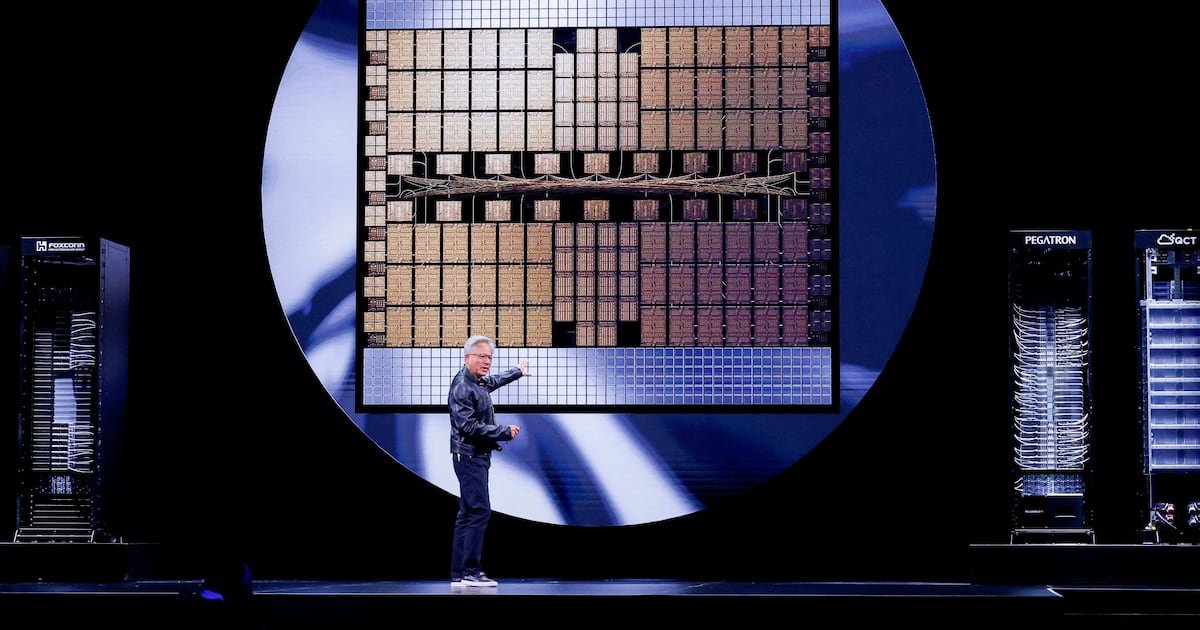Tools & Platforms
Nvidia earnings could be pivotal for pace of AI innovation

Nvidia’s earnings this week are being watched closely by Wall Street, but they will also affect billions of people who rely on the company’s chips to use apps, devices and online services.
The California-based company, the first to cross the $4 trillion mark in market value, designs the processors that power ChatGPT and TikTok’s recommendation engine. Snapchat’s augmented-reality features also rely on AI models that have been supported by Nvidia technology.
The company is forecast to announce revenue of $45.9 billion for its second fiscal quarter on Wednesday, after the market closes, Reuters reported.
Powering AI
“Nvidia’s products power the AI technology behind many devices and services we use daily,” said Jesse Jarvis, chief executive of data company Kaiko.
If Nvidia’s earnings are strong, platforms may accelerate the introduction of smarter recommendations, new creative tools and more advanced filters.
Users could see features including generative video or improved safety moderation reach their apps faster. But if supply remains constrained or costs rise, innovation could slow down and companies may look to recover costs.
That could mean delays in new features, higher subscription costs for AI services such as ChatGPT Plus, or more premium add-ons inside social apps.
The effects extend beyond software. Nvidia chips also power gaming PCs, laptops and cars, meaning shortages or price pressures could filter through to a wide variety of products.
In workplaces, Nvidia-backed AI systems are already being used to handle tasks once performed by people, raising the prospect of greater productivity and increased automation pressure on jobs.
Looking ahead, Mr Jarvis said consumers could expect “faster AI-powered applications, more accessible entry-level tools and the rise of new AI-integrated devices”.
‘Golden chips’
Daniel Ives, managing director at Wedbush Securities, called this “a monster week for the AI revolution and tech stocks with Nvidia earnings on deck”. He said demand for Nvidia’s processors continued to outpace supply. “From our Asia field checks, demand to supply is 10:1 for Nvidia’s golden chips,” he added.
Mr Ives said the coming results could spark another rally in technology stocks. “We believe Nvidia earnings on deck are another positive catalyst for tech stocks and a reminder this is still only the bottom of the second inning in the nine-inning game around building out the AI revolution over the coming years to enterprises/consumers globally,” he added.
But Nvidia’s dominance extends well beyond the technology sector, said Josh Gilbert, market analyst at eToro. “In the same way Apple symbolised the smartphone era, Nvidia now defines the AI era,” he said.
He noted that the company’s outsized role, comprising about 8 per cent of the S&P 500 – the largest weighting in history – increased the pressure to deliver.
Even small disappointments, he added, could spark volatility across global markets.
Path to affordability
AI pricing will follow the same trajectory as other breakthrough technology, said Fadi Ghandour, executive chairman of Wamda Group.
“AI, like all other new technologies, will start expensive and will very quickly move to become lower cost until it becomes ubiquitous and available to everyone at affordable prices,” he said.
He referred to Moore’s Law, saying AI could act as an “extension of brain power, multiplying our abilities to solve complex problems and have very complex information available to us instantaneously”.
Mr Jarvis echoed that sentiment, saying that while the cost of using AI is dropping quickly, large enterprises may still face higher overall bills. “The cost of using AI is falling quickly due to innovations, better efficiency and competition, making it easier for smaller businesses and individuals to access powerful tools and solutions,” he added.
Competition is growing from companies such as DeepSeek in China, which recently launched a new model, optimised for Chinese-made chips and designed to offer high performance at lower cost.
Mr Jarvis said competition played a key role in making AI cheaper for users. “New challengers put pricing pressure on incumbents, promote open-source models that reduce licensing costs and design smaller, more efficient systems that require less computing power and energy than the massive models of established firms,” he said.
The Middle East is also increasing investment in the sector, with Saudi Arabia and the UAE building massive AI-driven data centres alongside Nvidia and US hyperscalers.
Analysts say such spending will expand the use of AI in the coming years. “We are still in the early days of the AI revolution as the use cases are just starting to massively expand,” Mr Ives said. This week’s earnings will be “another ‘flex the muscles’ moment for [Nvidia chief executive] Jensen [Huang] and Nvidia, as well as the AI revolution bull thesis”, he added.
Tools & Platforms
Meta reportedly explores using rival AI models to enhance its apps

Meta is exploring the use of AI models from Google and OpenAI to enhance its apps while advancing its own Llama AI technology.
Meta is reportedly exploring the use of artificial intelligence models developed by competitors, including Google and OpenAI, to improve AI features across its platforms. According to a report by The Information, executives at the Meta Superintelligence Lab have considered integrating Google’s Gemini model into the company’s Meta AI chatbot. The move would enable Meta to offer a more robust, conversational text-based solution for answering user search queries.
The report also indicated that Meta has held discussions about incorporating OpenAI’s technology into Meta AI and its other AI-powered features. These potential collaborations highlight Meta’s effort to strengthen its AI capabilities while continuing to develop its own large language model, Llama.
Strategic partnerships as a temporary measure
A Meta spokesperson stated that the company is taking an “all-of-the-above approach to building the best AI products,” which includes both building in-house solutions and partnering with external organisations. The report noted that while Meta is exploring external technology, the company’s primary goal is to refine and advance its own AI systems. Leveraging competitor models would only be a temporary measure to accelerate innovation and keep pace with rivals in the rapidly evolving AI market.
Meta’s interest in adopting external AI tools comes at a time when competition in generative AI development is intensifying. By accessing technologies from industry leaders such as Google and OpenAI, Meta aims to enhance user experiences on its apps while gaining insights that can help strengthen future iterations of Llama.
Internal AI adoption and recruitment efforts
The Information reported that Meta employees are already using Anthropic’s AI models to support the company’s internal coding assistant. This indicates that Meta has been integrating third-party AI solutions internally even as it invests heavily in its own research and development.
Additionally, Meta has been actively recruiting AI researchers from Google and OpenAI to enhance expertise at its Superintelligence Lab. These recruitment efforts reportedly include highly competitive compensation packages designed to attract top talent from across the AI sector.
As Meta continues to refine its AI strategy, the company’s willingness to work with external partners shows its commitment to creating cutting-edge products. The temporary reliance on competitor models could help Meta accelerate development and maintain a strong position in the AI race.
Tools & Platforms
Tech expert warns of 'alarming' AI behavior after teen's death – Fox News
Tools & Platforms
Is AI turning your travel experience into a costly trap?

in this commentary
- A look at how travel companies are using AI to automatically bill you for rental car damage, in-room infractions, and higher airfares.
- An analysis of how these automated systems can make mistakes and why the burden of proof is shifting to the consumer.
- Actionable strategies you can use to protect yourself from AI-powered price hikes and false damage claims.
Worried about every little ding on your rental car? Do you always go into “anonymous” mode on your web browser before booking airline tickets?
If you do, then you probably have AI anxiety.
Travel companies are quietly deploying artificial intelligence systems, creating an invisible web of automated billing that can cost you hundreds or thousands of dollars—often without your knowledge or consent. From Hertz’s controversial AI vehicle scanners to hotel vapor detectors that fine guests when their hairdryers overheat, to airline pricing algorithms that jack up fares based on your browsing history, these systems operate in the shadows while your wallet takes a hit.
“Technology can make travelers feel powerless,” says Raymond Yorke, a spokesman for Redpoint Travel Protection. “It’s happening now. We’ve seen everything from automated rental car damage claims to a suspicious surge in airfare driven by dynamic pricing algorithms.”
But it doesn’t have to stay that way.
The technology promises efficiency and fairness, but travelers are discovering that AI often acts more like a digital pickpocket than an impartial assistant. The systems flag false positives, make decisions without human oversight, and shift the burden of proof onto customers who have to defend themselves against algorithmic accusations.
Where are the AI traps?
Rentals have become ground zero for AI overreach. Companies like Hertz are using technology from a company called UVeye that can reportedly detect paint inconsistencies and minor damages down to a millimeter level.
But critics say these systems can’t always distinguish between existing scratches, dirt or lighting changes, and genuine new damage. And car rental companies bill customers automatically, with limited avenues for appeal.
Legal consultant and AI specialist Nicola Cain notes that human intervention only happens when a customer raises a complaint, meaning the AI’s judgment stands unless you fight back. It should be the other way around, she says.
“Human oversight needs to be built into the process,” she adds.
Hotel chains are installing sophisticated sensor networks that go far beyond traditional smoke detectors. These systems monitor vapor particles, noise levels, occupancy counts, and even Wi-Fi usage patterns.
The systems are far from perfect. Ruth Cruz recently got hit with a $250 fee for smoking in her hotel room. She says the AI registered a false positive.
🖐️ Your voice matters
Have you been hit with a surprise charge you suspect was generated by an automated system? Do you think this technology makes travel more efficient, or is it just a new way for companies to make money?
And what are your best tips for protecting yourself from these AI traps?
Share your thoughts in the comments.
“I successfully disputed the charge by explaining the technical limitations of their detection system,” says Cruz, who edits a technology website in San Jose. (These types of errors are easy to find with a little sleuthing. Hers involved a quick online search.)
Airlines are perfecting the art of AI-powered price manipulation. For years, their systems have tracked your search history, location, device type, loyalty status, and dozens of other signals to predict your willingness to pay premium prices. AI is supercharging that practice.
Thomas O’Shaughnessy, a marketing executive from St. Louis, has noticed prices jumping dramatically when he researches flights.
“The price increases weren’t random,” he says. “I believe they were caused by an AI model that changes prices based on demand, the time of booking, and even the user’s search history.”
No wonder travelers have AI anxiety. The question is, what can they do about it?
How to fight the AI
“The key to fighting back is understanding that these systems prioritize speed and automation over accuracy,” explains Frank Harrison, regional security director for the Americas at World Travel Protection. “They’re designed to extract maximum revenue while hoping customers won’t challenge algorithmic decisions. But armed with the right documentation and strategies, travelers can level the playing field.”
Here are some strategies that will help you fight AI:
- Renting a car? Channel your inner Sherlock. Do a comprehensive walk-around and take photos of your car from all angles. Focus on areas AI commonly flags, like bumpers, wheel wells, and roof surfaces. Email these videos to yourself immediately for proof of when they were taken. Document everything—every scratch, every dent, every imperfection—before accepting any rental. And remember, you can always request a different vehicle if the one you’re renting has too many dings or dents.
- Don’t let ’em track you. Use private browsing or incognito mode when you book flights or hotels. Clear your cookies between searches. Use a VPN (Virtual Private Network) to shift your location. “I’ve seen price differences of $200 or more for the same flight just by appearing to browse from different cities,” says Joey Martin, an AI expert. Also, search for fares on multiple devices and compare prices across platforms. AI pricing algorithms often show different rates to smartphone users versus desktop browsers, or to logged-in loyalty members versus anonymous searchers.
- Open your hotel window, if possible. Don’t touch anything with a price tag. It’s true, AI is monitoring the air you breathe and the location of every Coke in your minibar. You already know what to do: Don’t touch the items in your minibar and keep your hotel room ventilated. If a surprise bill arrives, respond immediately and assertively. Ask for the original AI scan data, sensor logs, or algorithmic decision records that supposedly justify the charge. Most companies will struggle to provide concrete evidence that withstands scrutiny.
Bear in mind that these strategies will evolve. AI adjusts to consumer behavior, and you’ll have to make some course corrections along the way, too.
This is the start of an AI arms race
In travel, AI is an imperfect technology, registering false positives and erroneously billing consumers. It raises prices by hundreds of dollars per ticket, believing you’ll happily pay extra for your airfare because of your location. What’s more, these systems are a black box, so when you ask for proof that you damaged a car or removed something from a room, they can’t always provide it.
In short, this is nothing more than a digital money grab, and your AI anxiety is completely justified.
We’re at the beginning of an AI arms race. Travel companies are using machine learning to maximize their revenue. It’s time to fight back.
What happens next? The travel industry is busy deploying AI everywhere. Soon, systems could monitor carry-on luggage to ensure you’re paying for every bag. Hotels could find ways of automatically billing you for every missing towel or bathrobe. Car rental companies could turn their AI resources to car interiors, earning more money from stains or messy upholstery. And don’t even get me started on cruise lines!
Assume AI is tracking your every move — because it probably is.
Rental cars: Document everything
- Take a detailed video walk-around of the car before you leave the lot.
- Photograph every existing scratch, dent, and scuff, inside and out.
- Email the files to yourself immediately to create a timestamped record.
Airfare & hotels: Go undercover
- Use a VPN to mask your location and avoid geographic price targeting.
- Always search in your browser’s private or incognito mode.
- Clear your cookies between searches to prevent tracking.
Hotel rooms: Challenge the charges
- If you get a surprise fee, immediately demand the evidence.
- Ask for the specific sensor logs or AI scan data that triggered the charge.
- Most companies will waive the fee when you challenge them for proof.
-
Tools & Platforms3 weeks ago
Building Trust in Military AI Starts with Opening the Black Box – War on the Rocks
-

 Ethics & Policy1 month ago
Ethics & Policy1 month agoSDAIA Supports Saudi Arabia’s Leadership in Shaping Global AI Ethics, Policy, and Research – وكالة الأنباء السعودية
-

 Business2 days ago
Business2 days agoThe Guardian view on Trump and the Fed: independence is no substitute for accountability | Editorial
-

 Events & Conferences3 months ago
Events & Conferences3 months agoJourney to 1000 models: Scaling Instagram’s recommendation system
-

 Jobs & Careers2 months ago
Jobs & Careers2 months agoMumbai-based Perplexity Alternative Has 60k+ Users Without Funding
-

 Funding & Business2 months ago
Funding & Business2 months agoKayak and Expedia race to build AI travel agents that turn social posts into itineraries
-

 Education2 months ago
Education2 months agoVEX Robotics launches AI-powered classroom robotics system
-

 Podcasts & Talks2 months ago
Podcasts & Talks2 months agoHappy 4th of July! 🎆 Made with Veo 3 in Gemini
-

 Podcasts & Talks2 months ago
Podcasts & Talks2 months agoOpenAI 🤝 @teamganassi
-

 Jobs & Careers2 months ago
Jobs & Careers2 months agoAstrophel Aerospace Raises ₹6.84 Crore to Build Reusable Launch Vehicle




















